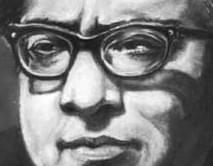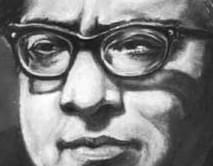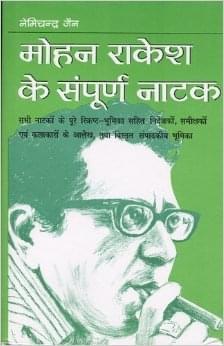Culture
Remembering Mohan Rakesh
Lalit Singh Pokhariya
Jan 08, 2015, 10:28 PM | Updated Feb 18, 2016, 12:01 PM IST
Save & read from anywhere!
Bookmark stories for easy access on any device or the Swarajya app.


January 8 is the birth anniversary of that great playwright of Hindi, Mohan Rakesh. To mark this, theatre director Lalit Singh Pokhariya sketches his profile.
One of the finest playwrights of Hindi to work on realism, Mohan Rakesh, was born this day, 1925, in Amritsar. Born in a nation ruled by the British, Rakesh lived through the freedom movement as a youth. He saw first-hand the rallying of millions under one flag in a non-violent manner and their participation in the unprecedented movement that was Quit India. He also saw in the form of the Second World War the ugly face of imperialism. To be sure, thousands of youth that were sensitive to their environment would have experienced the same because the events in question were, so to speak, epoch-changing. It was but natural that they have had an impact on the contemporary youth.
Mohan Rakesh read something more into the events of his times, though: something that was beyond the usual conclusions. They were these unique observations that helped in establishing Rakesh as a great storyteller and an equally great dramatist.
A studious and hungry-for-knowledge Rakesh graduated in English. Then, along with his postgraduate degrees in Sankrit and Hindi, he received the title of a Shastri in Sankrit. Having decided to make a living out of reading and writing, Rakesh worked on various jobs in Delhi, Jalandhar, Shimla, Mumbai and Lahore. Finally, he decided to diversify to independent writing and kept at it till his last days.
By the time he became a master playwright, Rakesh was already a consummate storyteller and novelist. Three of his novels — Andhere Band Kamre (Locked Dark Rooms), Antraal (Interval) and Na Aanevala Kal (The Tomorrow That Never Comes) — carved a niche for themselves in Hindi literature. In addition to this, he wrote short stories, travelogues, essays and even stories for children which were as, if not more, popular.
It is rarely that one finds a writer, who is as gifted in writing stories as he is in writing plays. Aashadh Ka Ek Din (A Day of Aashadh), Lahron Ke Rajhans (Swans of Waves), Aadhe-Adhure (Half and Incomplete), Pair Tale Ki Zameen (The Ground Below the Feet) are four and all of Rakesh’s plays. Apart from them, he also wrote a number of radio plays.
Rakesh only lived till he was 48. His untimely death came on 3 December 1972 when he gave in to a heart attack. All of Rakesh’s work was produced in a period of only 20-22 years. Yet the popularity of his works remains undiminished by time. In their expanse, they cover the period before he was born and his lifetime while they are still relevant and will remain so most certainly into the future.
As mentioned early in the piece, a young Rakesh lived through the historic events of the Indian freedom struggle and the Second World War. In that period, he was deep into his readings and studies. Rakesh then did not comment on the events per se as much as he tried to read beyond them. He chose as the themes of his works the ongoing conflict within individuals and the society of his time. Thus, they reflect themes of internal struggle, the prevalent horror of the times and love. His plays are but analyses and commentaries on these subjects.
Before Rakesh’s plays were published, master of surrealism and absurdism Bhuvneshwar had published his Taambe Ke Keede (Insects of Copper) and Azaadi Ki Neend (Sleep of Freedom). On the other hand, Dharamvir Bharti had written his legendaryAndha Yug (Blind Epoch). Jagdish Chandra Mathur’s Konark was out, too. In terms of the dominant style on stage and theatre literature, the works of Bhartendu Harishchandra and Jaishankar Prasad were leading. In both their chosen content and form, the above mentioned writers were producing works that cannot easily slip into realism. Naturally, their productions stayed true to the text and were not the kind to fit into the category as well. It was in this era of classical, folk and the Parsi-school theatre in which Rakesh displayed the mastery of his craft. The very plots that were adapted and staged in forms removed from realism were taken up by Rakesh and presented with realism with great expression, skill and success. It seems as if only Mohan Rakesh was blessed with the craft of synthesising the internal struggles of man and society of his time with realism.
In Aashadh Ka Ek Din, he describes a kind of love that is pure, clear and does not impose inhibitions on the other, a feeling that goes beyond bodily attractions and delves in the realm of human emotions. Aadhe-Adhure is about the damaging effects of industrialisation on a family and its values. Lahron Ke Rajhans is on the eternal debate between materialism and spirituality. Rakesh based his plots on the conflict between two polar-opposite values. His plays are also a deep meditation on the same, expressed in the language of human emotions.

It would be fair to call Rakesh a perfectionist. One of the great crafts that he had mastered was the grammar of theatre. All his plays are perfectly suited to theatre and radio alike. He wrote his plays while sitting with directors. Ace director, Om Shivpuri was a great friend of his. Rakesh was able to completely dismiss any pretensions associated with a writer; he respected a theatre director as a critical part of his writing process. The result of this is for all to see — Rakesh’s plays do not seem written as much by a playwright as by a director or an actor.
Rakesh was also ruthless with his works like few could be. Up to five drafts of Lahron Ke Rajhans were dumped before the play took its final form. Not many writers can be as impartial as he was towards one’s own creations.
Hindi theatre would ever remain grateful to Rakesh for two reasons. He not only enriched it with first-rate literature, but also gave it plays that were immensely popular when staged. Today, on his birth anniversary, we hope Mohan Rakesh will forever remain an inspiration for excellence in art and creativity.
Arush Tandon translated Lalit Singh Pokhariya’s piece from Hindi.
Lalit Singh Pokhariya is a veteran theatre director based in Lucknow. He has directed over 100 theatrical productions and has acted in over 400 shows of 60 plays.





